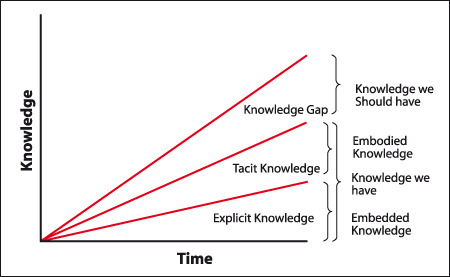Knowledge and competitive advantage
J. T. Pujitha PERERA
*******
At present most businesses are experiencing rapid
change in the market requiring them to think out of the box to win an
edge over competitors. However such thinking could only be possible if
the organization has an effective knowledge base within the firm.
Therefore knowledge can be considered as the most important strategic
resource for an organisation and is probably the closest to competitive
advantage.
********
 Though knowledge has wide definitions, in simplest meaning it refers
to the repository of facts and ideas either recorded within the
organization and articulated formally as pictures, models and documents
or the personal know-how, intelligence, and creativeness inherent by
people within the organization drawn through learning and education,
experience and awareness. Though knowledge has wide definitions, in simplest meaning it refers
to the repository of facts and ideas either recorded within the
organization and articulated formally as pictures, models and documents
or the personal know-how, intelligence, and creativeness inherent by
people within the organization drawn through learning and education,
experience and awareness.
The explicit knowledge referred above is more formal than tacit
knowledge and hence it can be easily transformed into language and
transmitted across the organization. The tacit knowledge on the other
hand is more personal where an individual's interpretation of a given
scenario may substantially vary depending on the intellectual ability of
the person. However tacit knowledge is considered to be a better source
of competitive advantage due to its ability to bring about unique change
within the organization.
Knowledge Management
The process of identifying, mapping and sharing knowledge is referred
to as Knowledge Management (KM). Though the concept of KM may not be as
novel as many believe it to be, some organizations have yet to
understand its true value to business. However certain organizations
purposely ignore KM due to their strong resistance to change. It is
commonly seen in many organizations, people are reluctant to accept new
cultures and also to share their experiences and competencies as they
perceived such actions will erode their bargaining power and supremacy
(created as a result of know-how) presently being enjoyed at work.
Nonetheless most organizations have accepted change to be inevitable
and hence no player can effectively sustain as a cost leader or a
differentiator without being a "knowledge leader" in the market.
Accordingly knowledge is the only form of survival in a complex and
dynamic market.
Tacit knowledge
To establish an effective KM system, a business should have an
environment conducive for knowledge sharing. Such environment should;
view change as a strategy, allow people to learn from their mistakes,
recognise creative ideas, encourage participation in decision-making,
reward creativity and innovation and promote informal group discussions.
It is important to note that whilst the explicit knowledge provides
better understanding about the knowledge base of an organization it is
the informal knowledge or the tacit knowledge that has the ability to
create the uniqueness required in the market to gain competitive
advantage.
To allow tacit knowledge to stream into the knowledge repository of
the organization it is vital that knowledge workers are identified and
retained within the firm. Knowledge workers are the people who could
effectively contribute in harvesting the repository of knowledge of the
organization.
They are people who have much desire to learn, acquire knowledge and
think out of the box to identify creative and innovative solutions.
Organizations should develop clear human resource policies which
facilitate in locating, recruiting, developing and rewarding knowledge
workers of the firm.
The best benefits of KM can only be derived when it is being viewed
as part of organization's overall strategy. It is imperative that the
top management carries a positive attitude on knowledge management for
it to be successfully implemented within the organization. This positive
approach not only motivates the knowledge workers but also will set an
example to others who generally follow the foot steps of top management.
Knowledge gap
To derive competitive advantage through KM it is important that each
organization obtains a critical understanding of its "knowledge gap".
The "knowledge gap" refers to the difference between the organization's
existing knowledge base and the required knowledge base. The required
knowledge base demonstrates the level of knowledge an organization
should have to outperform its rivals in the market. Upon recognising the
knowledge gap the organization should identify alternative strategies to
bridge the gap.
These strategies may include;
* recruiting experience knowledge workers for critical areas of
business (e.g sales and marketing, production, research and
development),
* developing effective communication channels to capture and
disseminate external and internal information in a timely and
comprehensive manner within the organization,
* Invest in knowledge based training models (e.g: web base training
and e-learning, simulation models,) which focuses on developing the
thinking ability of each individual within the organization, and
* Invest in knowledge management tools such as; collaborative
software (also known as groupware) intranets, decision support systems,
executive information systems and virtual systems.
Knowledge, in whatever way it is described has the true power to
bring about sustainable competitive advantage to an organization. The
essence of creative thinking blend with willingness to change will
enable the organization to be a true leader in the market. Further the
benefits of KM may include; promote learning and sharing culture,
enhance cultivation of best practices, improve creativity and innovation
and increase motivation among staff which are important aspects in
creating a sustainable business. |



